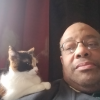Home » Jazz Articles » Multiple Reviews » Two Pianists Going Their Own Way: Carl Kennedy and Max Petersen
Two Pianists Going Their Own Way: Carl Kennedy and Max Petersen
 Carl Kennedy
Carl Kennedy American Lullaby
JeruJazz
2019
Carl Kennedy's precise and controlled playing draws from various strains of folk and classical music. Pieces like "Osage Avenue," "Arcus" and "The Clock" show him using a classical formality embellished and shaped by the excellent rhythm section of bassist Daniel Thatcher and drummer Andrew Green. More upbeat pieces, like "Furniture Music," "Children of The Fountain" and "Mountain Child" run along lighter and friskier lines with "Furniture Music"'s lazy grooves even evoking New Orleans soul.
Elsewhere the music carries a sense of drama. "Begin Again" comes off solemn and dignified in its mix of martial snare drumming and slowly deliberate piano and "American Lullaby" has a quietly powerful melody that winds along on piano over a softly throbbing bass. Both feel like folk hymns brought to life with understated but solid power. Kennedy and his trio make lovely music that alternates between frolicsome fun and quiet majesty.
 Max Petersen Trio
Max Petersen Trio Divine Traces
QFTF
2019
Max Petersen's piano style is the polar opposite of Carl Kennedy's. Where Kennedy is controlled, Petersen sounds wild and delirious, sweeping up and down the keyboard in broad melodic swoops, which is practically all he does on "Cadenza," plowing through dizzying solo runs. On "Advertency" he repeats galloping little riffs and speedy trills at changing tempos while drummer Fabian Arends provides constant tumbling motion. "Pathos Piece" has him sounding like a nervous Paul Bley with restless stop-start careening that builds into near-hysterics before quieting down.
On several tracks Petersen's flourishes become slower and more subdued. He attacks "Divine Traces" with a melancholy romantic grandeur and on "Gift" his notes quiet into attractive tinkling enveloped by Arends' rustling drums and Dominique Girod's thick bass plucks. "Bondi Boy" unfolds like a sinister lullaby with Petersen's fast running notes sounding like a strummed harp. Bass and drums accompany him in slow free-fall and a steady melody emerges out of the piano underneath it all. It is a jolting change of pace from all this over-the-top passion when Girod and Arends strike up an insinuating jazz groove on "No Change Please" while Petersen, after a few sprinkles of notes, eventually shows he can play very competent jazz piano. His music is full of emotion and can range from extreme agitation to crystalline silence. He benefits from having a fine rhythm section around to give form and purpose to his mood swings.
Tracks and Personnel
American Lullaby
Tracks: The Clock; Furniture Music; Arcus; Osage Avenue; Children of the Fountain; Begin Again; Mountain Child; American Lullaby.
Personnel: Carl Kennedy: piano; Daniel Thatcher: bass; Andrew Green: drum set, concert snare drum (6).
Divine Traces
Tracks: Pathos Piece; Advertency; Divine Traces; Cadenza; No Change Please; Gift; Bondi Boy.
Personnel: Max Petersen: piano; Dominique Girod: bass; Fabian Arends: drums.
< Previous
You Can Never Be Too Magical - Celebr...
Next >
Vulcan
Comments
Tags
Multiple Reviews
Jerome Wilson
Bud Powell
Bill Evans
Cecil Taylor
JeruJazz
Carl Kennedy
Daniel Thatcher
Andrew Green
QFTF
Max Petersen
Fabian Arends
Paul Bley
Dominique Girod
For the Love of Jazz
 All About Jazz has been a pillar of jazz since 1995, championing it as an art form and, more importantly, supporting the musicians who create it. Our enduring commitment has made "AAJ" one of the most culturally important websites of its kind, read by hundreds of thousands of fans, musicians and industry figures every month.
All About Jazz has been a pillar of jazz since 1995, championing it as an art form and, more importantly, supporting the musicians who create it. Our enduring commitment has made "AAJ" one of the most culturally important websites of its kind, read by hundreds of thousands of fans, musicians and industry figures every month.


















